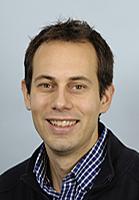Renato Renner (ETH Zürich)
UNE SÉRIE DE CONFÉRENCES / A SERIES OF LECTURES
Mercredi 12 octobre 2011, 16h30 / Wednesday, October 12, 2011, 4:30 pm
Centre de recherches mathématiques
Pavillon André-Aisenstadt, Université de Montréal
Salle / Room 1360
Conférence s'adressant à un large auditoire / Suitable for a general audience
What Does Quantum Cryptography Tell Us About Quantum Physics?
Heisenberg's uncertainty principle asserts that certain observable quantities, such as position and velocity of a quantum particle, cannot be simultaneously known to arbitrary precision. More than 25 years ago, it has been realized that this feature of quantum physics can be exploited in cryptography for securely transmitting secret messages over insecure channels. Since this discovery, research in the emerging area of quantum cryptography has resulted in a variety of remarkable insights on the nature of information. In my talk, I will show how these insights influence our understanding of physics. In particular, using cryptographic considerations, I will argue that quantum physics is the most informative theory that is compatible with experimental observations and therefore, in a certain sense, complete. (This lecture does not require prior knowledge of quantum physics.)
Une réception suivra la conférence au Salon Maurice-L'Abbé, Pavillon André-Aisenstadt (Salle 6245).
A reception will follow at the Salon Maurice-L'Abbé, Pavillon André-Aisenstadt (Room 6245).
CONFÉRENCE DANS LE CADRE DE L'ATELIER: Informatique quantique
LECTURE AT THE WORKSHOP: Quantum Computer Science
Mercredi 5 octobre 2011, 16h00 / Wednesday, October 5, 2011, 4:00 pm
Centre de recherches mathématiques
Pavillon André-Aisenstadt, Université de Montréal
Salle / Room 6214
Free Randomness Amplification
Assume that we have access to a source of weakly random bits, with the only guarantee that the entropy of each bit (conditioned on all previously available information) is above a certain threshold. In 1984, Santha and Vazirani showed that, in a purely classical setting, it is impossible to amplify the quality of such a source. More precisely, there is no (deterministic) function that transforms weakly random bits into (almost) uniform ones. In this talk, I will consider a quantum-physical scenario and show that, using entanglement, the amplification of weakly random sources becomes possible. An interesting implication of this result is that no perfect randomness is required for applications such as cryptography or for Bell tests.
CONFÉRENCE DANS LE CADRE DE L'ATELIER: Information quantique et la physique statistique
LECTURE AT THE WORKSHOP: Quantum Information in Quantum Many-body Physics
Jeudi 20 octobre 2011, 16h00 / Thursday, October 20, 2011, 4:00 pm
Centre de recherches mathématiques
Pavillon André-Aisenstadt, Université de Montréal
Salle / Room 6214
An Information-Theoretic View on Thermalization
How can the reversible dynamics of physical processes give rise to irreversible phenomena such as thermalization? I will reconsider this old question using modern tools from quantum information theory. In particular, I will show how recently developed techniques, such as the decoupling approach to quantum information, allow us to make quantitative statements about the thermalization properties of physical systems.
Renato Renner
